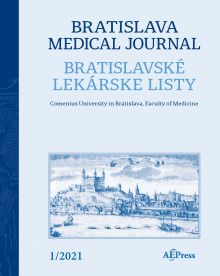Journal info
|
||||
Select Journal
Journals
Bratislava Medical Journal 2024 Ahead of print 2023 2022 2021 2020 2019 2018 2017 2016 2015 2014 2013 2012 Endocrine Regulations General Physiology and Biophysics Neoplasma Acta Virologica Studia Psychologica Cardiology Letters Psychológia a patopsych. dieťaťa Kovove Materialy-Metallic Materials Slovenská hudbaWebshop Cart
Your Cart is currently empty.
Info: Your browser does not accept cookies. To put products into your cart and purchase them you need to enable cookies.
Bratislava Medical Journal Vol.120, No.12, p.924–928, 2019 |
||
| Title: Effect of natural polyphenols on thromboxane levels in children with Crohn’s disease | ||
| Author: M. Kolacek, Z. Paduchova, M. Dvorakova, I. Zitnanova, I. Cierna, Z. Durackova, J. Muchova | ||
| Abstract: OBJECTIVES: The aim of this study was to investigate the relationship between thromboxane levels and oxidative stress in children with Crohn´s disease (CD), and examine the effect of natural polyphenolic compounds on thromboxane levels. METHODS: This study involved 14 children suffering from CD and 15 healthy controls. Patients were receiving the polyphenolic extract Pycnogenol for 10 weeks. Plasma levels of the static and dynamic forms of thromboxane B2 as well as their metabolite 11-dehydro thromboxane B2 in urine were determined. RESULTS: In comparison to controls, CD patients had significantly higher levels of the static and dynamic forms of thromboxane B2. Pycnogenol decreased the level of the dynamic form of thromboxane B2 after 10 weeks of administration. CONCLUSIONS: Paediatric Crohn’s disease is associated with higher thromboxane levels. Our results indicate that Pycnogenol administration reduces thromboxane levels, which may positively influence some clinical symptoms of CD such as thromboembolic episodes (Tab. 3, Ref. 49). |
||
| Keywords: Crohn´s disease, oxidative stress, Pycnogenol, thromboxanes | ||
| Published online: 18-Dec-2019 | ||
| Year: 2019, Volume: 120, Issue: 12 | Page From: 924, Page To: 928 | |
| doi:10.4149/BLL_2019_155 |
||
|
|
 download file download file |
|

